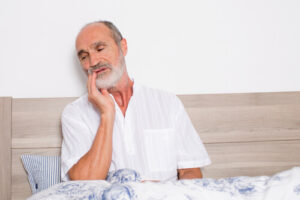As we age, our bodies undergo many changes, some of which can manifest in less expected ways. Excessive drooling in older people is one such condition that may raise concerns for both the individual and their caregivers. But what causes excessive drooling in older people? This question opens the door to a complex interplay of health factors, ranging from neurological disorders to dental issues.
In this article, we will delve into the various medical and physiological factors contributing to excessive salivation, aiming to shed light on this often overlooked condition.
Join us as we navigate through the intricacies of this delicate topic, offering insights and understanding into the lives of our senior population.
What causes excessive drooling in elders

Excessive drooling in older adults, or sialorrhea, is a condition that can stem from various health complications. It is not only a matter of discomfort but can also indicate more serious underlying medical issues. Here’s a closer look at the potential causes:
- Nervous System Disorders: Conditions like Parkinson’s disease, Alzheimer’s disease, and cerebral palsy can disrupt normal muscle control and swallowing reflexes and lead to drooling through the accumulation of saliva.
- Medication Side Effects: Certain drugs can stimulate the overproduction of saliva or affect the nervous system, resulting in increased drooling.
- Swallowing Difficulties: Dysphagia, or difficulty swallowing, can cause saliva to pool in the mouth, often due to weakened muscles or neurological conditions.
- Gastroesophageal Issues: GERD and acid reflux can heighten saliva production, with drooling becoming more pronounced during sleep or while reclining.
- Salivary Gland Overactivity: Some individuals may experience an overactive salivary response, leading to excess saliva production.
In conclusion, excessive drooling in elders is a multifaceted issue, often linked to neurological disorders, medication side effects, swallowing difficulties, and gastroesophageal issues. It is crucial to identify the underlying cause to tailor an effective treatment plan. If drooling is persistent or accompanied by other symptoms, seeking medical attention is essential to address potential health concerns and improve quality of life.
Other symptoms associated with chronic drooling
Chronic drooling, medically termed sialorrhea, is often accompanied by a spectrum of symptoms that can affect an individual’s health and daily life. Understanding these associated symptoms is crucial for comprehensive care and management. Here are some of the common co-occurring symptoms of stop-drooling:
- Speech Difficulties: Excess saliva can interfere with normal speech, causing slurred or unclear articulation, which may impact communication.
- Skin Irritation: Persistent moisture around the mouth can lead to skin breakdown, irritation, and infection, often requiring additional treatment.
- Swallowing Challenges: Chronic drooling is frequently linked with dysphagia, where the act of swallowing is compromised, potentially leading to malnutrition or dehydration.
- Dental Health Issues: Excessive saliva can contribute to dental decay and gum disease, which may alter the mouth’s normal bacterial environment.
- Social and Psychological Impact: The visibility of drooling can lead to embarrassment, social isolation, and psychological distress, affecting the individual’s quality of life.
Chronic drooling extends beyond saliva escaping the mouth; it is often a sign of underlying health issues that can manifest through various symptoms. These symptoms, ranging from speech difficulties to social impacts, necessitate a multidisciplinary approach to treatment and support. Addressing these symptoms holistically can lead to better managing chronic drooling and an improved quality of life for those affected.
How to stop excessive saliva production

Excessive saliva production can be a bothersome issue, affecting speech, eating, and social interactions. To address this, a detailed approach is necessary, focusing on both medical interventions and home care strategies to prevent drooling. Here are some key points to treat drooling:
- Medical Evaluation: It’s essential to consult with a healthcare provider to identify any underlying causes of excessive saliva production, such as gastroesophageal reflux disease (GERD) or neurological conditions, which may require specific treatments.
- Medication Adjustments: Certain medications can stimulate saliva production. Reviewing your current medications with a doctor might lead to adjustments that can help manage saliva levels.
- Oral Devices: Dentists can provide oral devices that help control saliva flow and improve lip closure, which can be particularly helpful in cases of neurological impairment.
- Therapeutic Interventions: Speech or occupational therapy can offer exercises to strengthen muscles around the mouth, improving control over saliva.
- Dietary Considerations: Avoiding foods and beverages that increase saliva production, such as sour candies or acidic foods, can be beneficial.
- Surgical Options: In severe cases, procedures to remove or re-route salivary glands are considered, though these are typically last resort measures due to potential complications.
Excessive saliva production can be mitigated through medical treatment, lifestyle adjustments, and therapeutic interventions. By identifying the root cause and implementing targeted strategies, individuals can achieve better management of saliva production, leading to improved comfort and quality of life.
When to seek medical attention
Drooling, while often not a sign of a serious medical condition or issue, can sometimes indicate underlying health concerns that require professional evaluation. Discerning when to seek medical attention is crucial for effective management and treatment. Here’s a structured approach to understanding this need:
- Persistent or Worsening Symptoms: If drooling is continuous or worsening, it’s important to consult a healthcare provider to rule out or address any serious conditions.
- Associated Symptoms: Accompanying symptoms such as difficulty swallowing, speech difficulties, or changes in muscle control can signal neurological disorders or other medical conditions that need immediate attention.
- Impact on Daily Life: When drooling affects daily activities social interactions, or leads to skin irritation around the mouth, it’s time to seek medical advice for potential treatment options.
- Medication Side Effects: If the onset of drooling coincides with starting new medications, a review with a healthcare provider is necessary to adjust the medication.
Persistent drooling, associated with other symptoms, begins in adulthood, impacts daily life, or may be related to medication side effects, should prompt a visit to a healthcare provider. Timely medical attention ensures proper diagnosis and management, improving the individual’s quality of life and overall well-being.
Conclusion
In wrapping up our discussion on what causes excessive drooling in older people, it’s clear that this condition can stem from various sources. Whether due to natural aging processes affecting muscle control, neurological conditions, or as a side effect of certain medications, each case demands careful consideration. Caregivers and family members need to observe and understand the specific factors contributing to an elderly individual’s drooling, as this knowledge can guide appropriate medical consultation and treatment. Addressing the root cause of excessive drooling can significantly enhance an older adult’s comfort and quality of life, underscoring the importance of seeking professional healthcare advice when this symptom arises.
References
Drooling: What Causes It and How to Stop
https://www.healthline.com/health/drooling
Drooling (Sialorrhea) in Parkinson’s Disease
https://www.parkinson.org/understanding-parkinsons/movement-symptoms/drooling
What Causes Drooling in Older Adults?
https://www.medicinenet.com/what_causes_drooling_in_older_adults/article.htm
What Causes Drooling?
https://www.verywellhealth.com/what-causes-drooling-1191909
Sialorrhea in Adults: A Review of Current Diagnostic and Treatment Options
https://academic.oup.com/innovateage/article/1/suppl_1/398/3898287



More Stories
Thickened Drinks for the Elderly: Enhancing Safety and Hydration
Homemade Protein Shakes for Elderly: A Nutritious Boost for Aging Health
Food for Elderly with Swallowing Difficulties: 7 Food Ideas Explored